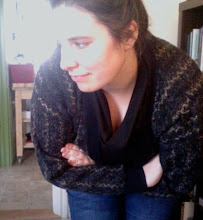Gender becomes such a vital part of how we judge others, and the idea that a girl's anger is irrational is instilled, and then the girl with the eating disorder or the girl who cuts herself is ignored or scrutinized for having feelings and wanting help. It has to be realized that if a woman or girl is upset about something, it's not just because she wants attention. And if she does want attention, maybe it's because she wants care. Is that something to dismiss? What happens when we do dismiss it? I'm not sure I want to know.I read this and remember the guilt that accompanied my decision not to teach this semester. And then the increased guilt when Stefan was laid off shortly after I made that decision. And then the guilt became nearly overwhelming when I wasn't working, wasn't writing my dissertation, wasn't contributing in any visible way to my marriage, my family, my community. I was sick, and I needed help, and I felt immensely selfish, despite knowing intellectually if not emotionally that all of it -- the inner work, the break from external stressors -- was absolutely, crucially necessary.
"If she does want attention, maybe it's because she wants care."
I am reminded, too, of the competitive feelings toward other women that I've been recognizing lately in myself. I'm certain that I've rolled my eyes at a woman expressing her seemingly unjustified troubles and thought, "Oh, she's just looking for attention." And I realize that maybe this woman did want attention. And care. And I wonder: doesn't that amount to the same need? I want people to pay attention to me because I sense somewhere within me a lack, a gaping hole of imperfection, and I imagine that their affirmations will fill that hole. I've focused mostly on myself these past six months or so, and I have to remember that I did so because I needed attention and care and kindness, from others and from myself.
All words and actions are either an expression of love or a call for love. Simplistic and saturated with truth, as I find are most teachings from A Course in Miracles, this notion means that in judging others, we reveal a need for love in ourselves. And in seeing this truth, we can peel away some of the caked-on layers of distrust and sadness and vindictiveness, and emanate love instead of needing to ask for it.
But asking for love? That is okay, too: when you do, you're expressing love for the truest part of you.



WOW! What a beautiful post. I just wrote about learning how to be angry and be okay at the same time. And I think it also has to do with gender issues. And with not knowing how asking for help or attention or love is supposed to look. But your second-to-last paragraph really says it all! And it reminds me that what we value most in our friends is not what they give to us, but what we can give to them, and so it's an ultimate act of love and friendship to ask for help...
ReplyDeleteWhat a thought-provoking post. I love the sentence that in judging others, we reveal a need for love in ourselves. I also think that in judging others, we find a crucible into what it is we are struggling with or might be lacking-- if we judge someone else's weight, then weight in some way is an issue for us; if we judge the way we mother, than perhaps we are reflecting on how we were mothered or are mothering or will mother or... Judgment, thus, is really a window into ourselves. And if we want to get past the place of judging, we should study our judging.
ReplyDelete